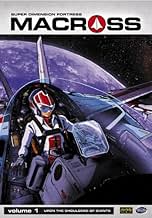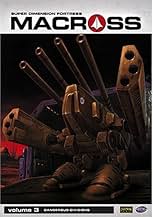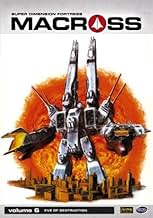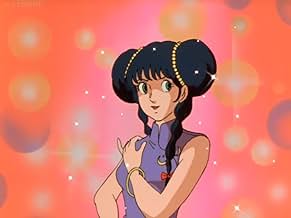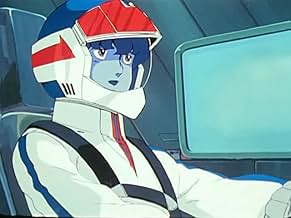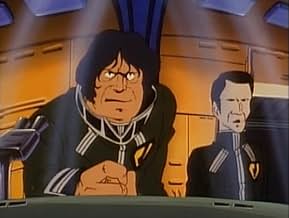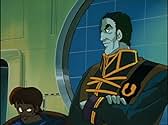AVALIAÇÃO DA IMDb
8,5/10
2,5 mil
SUA AVALIAÇÃO
Adicionar um enredo no seu idiomaAn alien spaceship crash lands on Earth and her secrets lead to a desperate war against an alien enemy sent to retrieve the ship.An alien spaceship crash lands on Earth and her secrets lead to a desperate war against an alien enemy sent to retrieve the ship.An alien spaceship crash lands on Earth and her secrets lead to a desperate war against an alien enemy sent to retrieve the ship.
Explorar episódios
Avaliações em destaque
In the year 1999 a city-sized extraterrestrial battle cruiser crash lands on Earth, and over the next decade scientists and engineers repair its damage and refit it into a hybrid of human and alien technologies. What the Earth-folks don't realize is that the ship has been tailed by an entire armada of heavily armed space battle cruisers who seek to claim the ship and its secrets for themselves. The aliens, called Zentraedi, are a formidable race of giants who have been bred for warfare, but as they approach their presence triggers a booby trap on the downed space-fortress called the Macross that plows through them with a devastating energy weapon. Thinking the Earth fired upon them intentionally, the Zentraedi retaliate, thereby launching Space War I. Realizing that it would probably be a good idea to move the conflict off of the Earth (which has just gotten over a long on-planet war), the captain of the Macross orders the use of the ship's untested "fold" system to warp the ship to the dark side of the moon; the warp is initiated, but it brings the small city that had grown around the Macross with it, plus, to the horror of all involved, they find themselves just outside orbit near Pluto (that's what you get for messing around with technology that you don't know how to operate!). And as if that isn't bad enough, the fold system has completely vanished, leaving the ship's crew and the now-rescued inhabitants of the city no alternative but to make their way back home using only conventional engines. And as the Macross crawls back to the Earth, the enemy fleet is not far behind...
That's the basic setup, but what makes Macross stand out from the plethora of alien invasion space operas that came before it most notably the classic Space Battleship Yamato (1974) is its focus on the human element of its story, becoming in essence a soap opera in sci-fi drag. Nearly every character is in some way flawed, and despite the military experience held by many of them, that experience frequently proves moot in the face of deep space combat and technologies that they simply do not comprehend. The ostensible hero, sixteen-year-old stunt pilot Hikaru Ichijo, comes of age during the course of the narrative and we follow him through every awkward step, tracing his evolution from prodigy civilian airman to ace space-fighter, as well as seeing him swallow his reluctance to kill once he joins the United Nations Space Navy (annoyingly dubbed the "UN Spacy" for short). Hikaru's also at the center of a love triangle that sees his emotions split between a cute Chinese girl who ends up going from waitress to pop idol overnight, and his by-the-book career military commanding officer; this triangle is milked for all it's worth and is the primary reason that the series proved so popular with female viewers, along with the romantic trials and tribulations of the rest of the voluminous cast.
Another thing that sets the series apart from the cliché template is the pan-cultural scope of the cast. The hero may be Japanese, but the rest of the characters run the ethnic gamut, the bridge crew alone being comprised of a couple of Russians, an American or two, an Italian, and a black chick. This was very refreshing at the time, with the then-most-contemporary multi-cultural cast of characters being found in the various incarnations of Cyborg 009, but each member of that international team was drawn in the most broad of ethnic stereotypes. Not so with Macross, which didn't make a big deal ou t of the characters' ethnicities and saw only the Chinese character standing out because of her frequently-worn Hong Kong-style dresses and hairstyles.
And while the show certainly has a contingent of fans who revere it for its space battles and transforming mecha, I have to say that I love it most for starting things off on a footing that allows the viewer to think they know exactly where the story's going to go and then consistently pulling the rug out from under them. The love triangle plays out in a way that sees all three participants change and grow, the B-characters go through some serious drama involving the tragic casualties of war and the possibilities that can blossom between even the most bitter of enemy rivalries (let's hear it for Max and Millia!!!), and even the enemy aliens prove to be far more than just stock evil world-conquerers when their strange and ancient history proves that there really is something to the universal nature of basic "humanity."
Super Dimension Fortress Macross is easily the most well-crafted and intelligent of the space operas from the 1980's, both in terms of narrative and visual impact, and totally raised the bar on how such material can and should be handled. In fact, the only serialized alien invasion show to come along since that even comes close is Neon Genesis Evangelion (1995), a series that wears its Macross influence on its sleeve but somehow comes up a lot less satisfying. If you can get your hands on the Animeigo boxed sets of the original uncut and subtitled Macross series avoid the sequels and the not bad Americanized version, Robotech do yourself the favor and check them out, starting with episode number one because the whole thing's one long story told in thirty-six chapters. Even if you're not an anime fan I urge you to give this stuff a chance. Space operas seldom get any better than this, and Super Dimension Fortress Macross sure as hell beats the three recent Star Wars atrocities.
That's the basic setup, but what makes Macross stand out from the plethora of alien invasion space operas that came before it most notably the classic Space Battleship Yamato (1974) is its focus on the human element of its story, becoming in essence a soap opera in sci-fi drag. Nearly every character is in some way flawed, and despite the military experience held by many of them, that experience frequently proves moot in the face of deep space combat and technologies that they simply do not comprehend. The ostensible hero, sixteen-year-old stunt pilot Hikaru Ichijo, comes of age during the course of the narrative and we follow him through every awkward step, tracing his evolution from prodigy civilian airman to ace space-fighter, as well as seeing him swallow his reluctance to kill once he joins the United Nations Space Navy (annoyingly dubbed the "UN Spacy" for short). Hikaru's also at the center of a love triangle that sees his emotions split between a cute Chinese girl who ends up going from waitress to pop idol overnight, and his by-the-book career military commanding officer; this triangle is milked for all it's worth and is the primary reason that the series proved so popular with female viewers, along with the romantic trials and tribulations of the rest of the voluminous cast.
Another thing that sets the series apart from the cliché template is the pan-cultural scope of the cast. The hero may be Japanese, but the rest of the characters run the ethnic gamut, the bridge crew alone being comprised of a couple of Russians, an American or two, an Italian, and a black chick. This was very refreshing at the time, with the then-most-contemporary multi-cultural cast of characters being found in the various incarnations of Cyborg 009, but each member of that international team was drawn in the most broad of ethnic stereotypes. Not so with Macross, which didn't make a big deal ou t of the characters' ethnicities and saw only the Chinese character standing out because of her frequently-worn Hong Kong-style dresses and hairstyles.
And while the show certainly has a contingent of fans who revere it for its space battles and transforming mecha, I have to say that I love it most for starting things off on a footing that allows the viewer to think they know exactly where the story's going to go and then consistently pulling the rug out from under them. The love triangle plays out in a way that sees all three participants change and grow, the B-characters go through some serious drama involving the tragic casualties of war and the possibilities that can blossom between even the most bitter of enemy rivalries (let's hear it for Max and Millia!!!), and even the enemy aliens prove to be far more than just stock evil world-conquerers when their strange and ancient history proves that there really is something to the universal nature of basic "humanity."
Super Dimension Fortress Macross is easily the most well-crafted and intelligent of the space operas from the 1980's, both in terms of narrative and visual impact, and totally raised the bar on how such material can and should be handled. In fact, the only serialized alien invasion show to come along since that even comes close is Neon Genesis Evangelion (1995), a series that wears its Macross influence on its sleeve but somehow comes up a lot less satisfying. If you can get your hands on the Animeigo boxed sets of the original uncut and subtitled Macross series avoid the sequels and the not bad Americanized version, Robotech do yourself the favor and check them out, starting with episode number one because the whole thing's one long story told in thirty-six chapters. Even if you're not an anime fan I urge you to give this stuff a chance. Space operas seldom get any better than this, and Super Dimension Fortress Macross sure as hell beats the three recent Star Wars atrocities.
This anime series is one of the most outstanding anime series available. As many have said, it was one of the first I saw and it hooked me to anime for life. Now the original Macross series is available uncut on DVD from Animeigo. I recently purchased the limited edition box set and it was amazing! For all you searching for this series, it's now easily available in the U.S.! It's a must.
Macross... The original.
Originally intended to be just a parody of Gundam, it evolved into becoming an entity of its own, with a compelling storyline and a deeply anti-war message.
Genre-defining character designs by Haruhiko Mikimoto, excellent space craft and mecha designs by Shoji Kawamori and Kazutaka Miyatake and great directing work by Noboru Ishiguro were the first part of Macross' enormous success. Shoji Kawamori's VF-1 Valkyrie is one of the most easily identified anime mecha ever and for good reason: I've yet to see one that can match its sleek, yet strong and purposeful lines. It looks like it's ready to take off and go on a war, whereas other mecha often look like gimmicks.
The characters seemed to actually live and breathe, developing their personalities through the ordeal of their perversely unequal war against the Zentradi, the loss of friends, loved ones, the senseless suffering and carnage that war is, their change of heart over time...
And all this enhanced by the very fine voice acting of Arihiro Hase, Mari Iijima, Mika Doi, Akira Kamiya, Michio Hazama, Noriko Ohara and other distinguished Japanese voice actors and actresses, who conveyed the dialogue in a manner forceful, economical, emotionally wealthy and mature.
Add to this Mari Iijima's excellent voice and performance on each and every one of Lynn Minmay's songs - even the songs seem to evolve as Minmay grows: from the childish and girlie-love pop of "Zero-G Love" and "Watashi No Kare Wa Pairotto" ("My Boyfriend Is A Pilot") to the beautiful, softly-sung and emotionally overwhelming anti-war "Ai Wa Nagareru" ("Love Drifts Away"), which was performed during the Macross' battle against Gorg Bodolzaa's armada, the equally powerful elegy "My Beautiful Place" or the series' last song, "Yasashisa Sayonara" (Farewell Tenderness"). And the rest of Macross' soundtrack is a wonderful merger of a symphonic orchestra with rock, jazz and even blues influences.
Macross is a sad story; it is not quite an epic, although it features battle after battle. It's an anti-war story - it brings forth a message to everyone, a message stating that the works of peace and culture are immensely superior to the cruel barbarity of war.
Sadly, in the haste to produce the episodes fast enough, a number of episodes was farmed out to a Korean studio named Anime Friend, whose work was sub-par and introduced a fair number of animation errors. Despite this, Macross still is a shining gem and deservedly enjoys a strong following in Japan and internationally, even now, 20 years on.
Unfortunately for the Western world, in 1985, an American company named Harmony Gold and someone named Carl Macek combined Macross with two other anime series (Super Dimension Cavalry Southern Cross and Genesis Pit Climber M.O.S.P.E.A.D.A.), dumbing down the dialogues, to which they added even more (to the point where you wondered if the characters ever stop talking), replacing the meticulous use of silence with excessive narration with someone who sounds like a sportscaster on steroids, the cohesive storyline with a mangled patchwork, the artful voice acting with over-the-top "performances" by third-rate "actors", the lovely soundtrack with generic synth stuff, Mari Iijima's wonderful songs with outrageous "creations" "performed" by the Reba West (Rebecca Forstadt), who is more annoying than a car alarm. The worst display of Harmony Gold's inability to comprehend ANYTHING that Macross stands for is the replacement of "Ai Wa Nagareru" with the jingoistic attempt at anthem-writing titled "We Will Win".
Originally intended to be just a parody of Gundam, it evolved into becoming an entity of its own, with a compelling storyline and a deeply anti-war message.
Genre-defining character designs by Haruhiko Mikimoto, excellent space craft and mecha designs by Shoji Kawamori and Kazutaka Miyatake and great directing work by Noboru Ishiguro were the first part of Macross' enormous success. Shoji Kawamori's VF-1 Valkyrie is one of the most easily identified anime mecha ever and for good reason: I've yet to see one that can match its sleek, yet strong and purposeful lines. It looks like it's ready to take off and go on a war, whereas other mecha often look like gimmicks.
The characters seemed to actually live and breathe, developing their personalities through the ordeal of their perversely unequal war against the Zentradi, the loss of friends, loved ones, the senseless suffering and carnage that war is, their change of heart over time...
And all this enhanced by the very fine voice acting of Arihiro Hase, Mari Iijima, Mika Doi, Akira Kamiya, Michio Hazama, Noriko Ohara and other distinguished Japanese voice actors and actresses, who conveyed the dialogue in a manner forceful, economical, emotionally wealthy and mature.
Add to this Mari Iijima's excellent voice and performance on each and every one of Lynn Minmay's songs - even the songs seem to evolve as Minmay grows: from the childish and girlie-love pop of "Zero-G Love" and "Watashi No Kare Wa Pairotto" ("My Boyfriend Is A Pilot") to the beautiful, softly-sung and emotionally overwhelming anti-war "Ai Wa Nagareru" ("Love Drifts Away"), which was performed during the Macross' battle against Gorg Bodolzaa's armada, the equally powerful elegy "My Beautiful Place" or the series' last song, "Yasashisa Sayonara" (Farewell Tenderness"). And the rest of Macross' soundtrack is a wonderful merger of a symphonic orchestra with rock, jazz and even blues influences.
Macross is a sad story; it is not quite an epic, although it features battle after battle. It's an anti-war story - it brings forth a message to everyone, a message stating that the works of peace and culture are immensely superior to the cruel barbarity of war.
Sadly, in the haste to produce the episodes fast enough, a number of episodes was farmed out to a Korean studio named Anime Friend, whose work was sub-par and introduced a fair number of animation errors. Despite this, Macross still is a shining gem and deservedly enjoys a strong following in Japan and internationally, even now, 20 years on.
Unfortunately for the Western world, in 1985, an American company named Harmony Gold and someone named Carl Macek combined Macross with two other anime series (Super Dimension Cavalry Southern Cross and Genesis Pit Climber M.O.S.P.E.A.D.A.), dumbing down the dialogues, to which they added even more (to the point where you wondered if the characters ever stop talking), replacing the meticulous use of silence with excessive narration with someone who sounds like a sportscaster on steroids, the cohesive storyline with a mangled patchwork, the artful voice acting with over-the-top "performances" by third-rate "actors", the lovely soundtrack with generic synth stuff, Mari Iijima's wonderful songs with outrageous "creations" "performed" by the Reba West (Rebecca Forstadt), who is more annoying than a car alarm. The worst display of Harmony Gold's inability to comprehend ANYTHING that Macross stands for is the replacement of "Ai Wa Nagareru" with the jingoistic attempt at anthem-writing titled "We Will Win".
Many fans dislike the Robotech version of Macross, but there is a more faithful, official English dub out there, and it's pretty great! If you're not a subtitle fan or just want one more way to experience this awesome show, check out the ADV dub from the mid-2000s! If you can't locate an original copy, there are plenty of unlicensed copies on certain giant auction websites :)
Still has a strong following and for good reason: The plot, the character descriptions, the mecha, the music, everything was wonderfully done - except for some sub-par episodes done by a Korean studio.
The voice acting was just what you would expect from self-respecting professionals. The storyline is tight and cohesive, while the characters seem to actually grow and mature before the viewer's eyes, seeming like actual personalities rather than just being mediums for the action.
This is definitely an anime everyone must see.
The voice acting was just what you would expect from self-respecting professionals. The storyline is tight and cohesive, while the characters seem to actually grow and mature before the viewer's eyes, seeming like actual personalities rather than just being mediums for the action.
This is definitely an anime everyone must see.
Você sabia?
- CuriosidadesThe codename for the Macross bridge is Gunsight One. Gunsight One was a Gundam fan club founded by some of the staff members (such as creator Shoji Kawamori and character designer Haruhiko Mikimoto), mecha and anime fanatics on their own right.
- Erros de gravaçãoDue to the fact that at least three studios of wildly varying quality worked on each episode simultaneously, many minor continuity errors and animation inconsistencies (for instance in Ep. 3 "Spacefold" where the escape pod under Roy's Valk every so often switches to a gunpod) crop up in each episode.
- Citações
Max Jenius: Wonderful. Bust, 83 cm. Will expand when unwrapped.
- Cenas durante ou pós-créditosThe original showing of the pilot episode had a different beginning, not revealing the transforming capabilities of the Valkyries in order to give the audience a suprise. The opening was changed to the regular one for all further showings.
- Versões alternativasThe first two episodes were originally edited in to one hour-long episode for the show's premiere on 5 October 1982 in the Osaka region. The opening of the show was changed to avoid any shots of Hikaru in a Valkyrie or the Valkyrie's "Battroid" (full robot) mode.
- Trilhas sonorasMy Boyfriend is a Pilot
Performed by Mari Iijima
Principais escolhas
Faça login para avaliar e ver a lista de recomendações personalizadas
- How many seasons does Super Dimension Fortress Macross have?Fornecido pela Alexa
Detalhes
Contribua para esta página
Sugerir uma alteração ou adicionar conteúdo ausente

Principal brecha
By what name was Guerra das Galáxias (1982) officially released in India in English?
Responda


